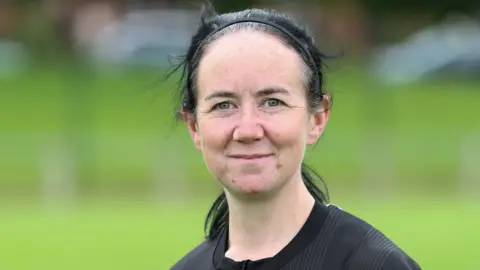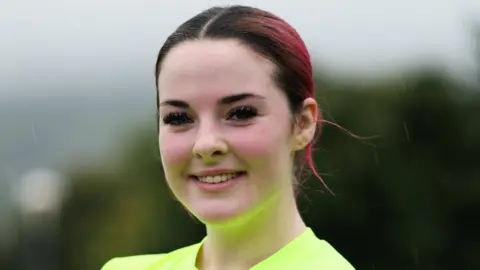Football referees: Why should I be abused for 90 minutes?
 IFA
IFAFrom being pushed, to threatening behaviour and sexist abuse, two female football referees have spoken out against the violence they endure.
Maria Creaney, 37, and 16-year-old Halle O'Brien are being supported by the Irish Football Association's (IFA) Catch Yourself On campaign.
Last year Maria had to abandon a game due to the aggression and abuse of a coach who made her feel threatened.
"Football is my life but we are only human," she said.
"I had never felt in danger while refereeing - this was the first time I had," she told BBC News NI.
"My family and friends were so worried and annoyed for me and it did make me re-evaluate what I was doing."
'We're just like you'
The referee said people needed to remember football was just a game for everyone to enjoy.
"I know I won't get every single call right but we try to be impartial and we'll always do our best," she said.
"Sometimes people need to remember that we're wives, partners, mothers, daughters, fathers, husbands, sons, aunties, uncles, brothers, sisters, whatever - we're just like you.
"You wouldn't like to be screamed at and abused for 90 minutes so why do you think the person in the middle of the pitch should be?"
 IFA
IFAA few weeks ago Halle O'Brien was pushed by a young player as she walked off the pitch.
"It shook me in the weeks after and it did make me think about if I really wanted to keep doing this," said the west Belfast teenager.
"It's not something that would push me away, I think, but it is shocking sometimes, the things that happen."
Halle said that on occasion people have made adverse comments simply because she is a woman, something she said makes the experience "that bit worse".
Lots of people have made comments about her body while she has been officiating too, she said.
"There have also been times when I've been shoved or attempted to be hit or pushed by players just because I've made a decision," she added.
'I feel more resilient now'
The IFA's Catch Yourself On scheme aims to boost referee retention and recruitment at all levels of the game.
It means there will be bigger sanctions for those who abuse referees and clubs will also be asked to nominate a new match official liaison officer to support officials during games.
"A campaign like this is so important because it shows you that you will be protected from abuse and that abuse towards officials will no longer be tolerated," said Maria, who is also from west Belfast.
"A lot of it goes over my head now and I try to just concentrate on the football but obviously the odd comment does get through and you wonder why someone would even say something like that."
When she started refereeing, the abuse left her feeling down.
"I cried over it - but I do feel a lot more resilient now," she said.
"I didn't think it was going to be as hard or rewarding as what it has been."
'We are all human'
It's a similar story for Halle.
"It definitely wasn't what I expected it to be," she said.
"I didn't realise how much abuse and comments and hard times referees go through.
"This campaign is to show people that there are good sides to refereeing too and hopefully now referees will feel more supported.
"I feel like if there was a young girl or boy watching the match and they wanted to go into refereeing and they heard the things that go on sometimes it might put them off, and that's really sad.
"It's an amazing thing to get into."
Her message to would-be abusers is to remember that we are all human.
"Whenever we leave the pitch, we do the same things everybody else does," she said.
"Everybody makes mistakes and although sometimes people may not agree with the referee's decision, it doesn't always mean it's not right."
- If you have been affected by any of the issues raised in this story you can visit BBC Action Line.
